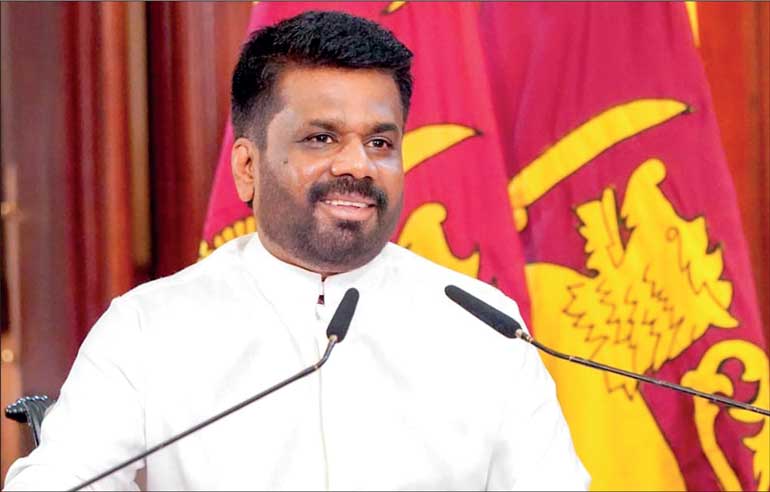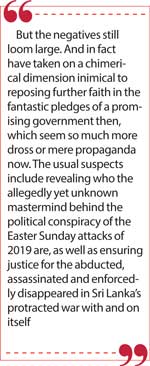Saturday Feb 21, 2026
Saturday Feb 21, 2026
Friday, 19 September 2025 00:28 - - {{hitsCtrl.values.hits}}

That the NPP-dominated House is starting to walk the talk on promises that its leader made on his remarkable campaign trail must redound to the credit of every one of those 159 National People’s Power MPs
 As the first year of a House commandeered by the NPP has come round, it is timely, appropriate and opportune to examine the track record of a tyro government in the 365 days just past.
As the first year of a House commandeered by the NPP has come round, it is timely, appropriate and opportune to examine the track record of a tyro government in the 365 days just past.
It is timely because the traditional honeymoon period, in which a people content from only recently casting the ballot cut a newbie administration a gracious slice of charitable slack, is now over.
And there is no more appropriate a motive than keeping the NPP, led by the JVP, those vociferous critics of past regimes, accountable in just and similar vein.
Also opportune because the National People’s Power produced a fait accompli to coincide with its first anniversary in parliament and in power to justify its erstwhile campaign trail promises.
In the form or shape of the Presidents’ Entitlements (Repeal) Bill, it was recently passed in parliament by a resounding majority of 150 (66.6%) votes.
While the Government for its part presented it as part of keeping its election pledges, opposition voices sulked that this was yet another example of political revenge – a claim that no doubt resonated with the former chief executives who were now compelled to vacate their state-funded stately homes.
If some of the ironies therein were lost on the hoi polloi, perhaps this is one space in which to rehearse the same.
Former head of state CBK – pursuing punctuality as always, but somehow finding timeliness to outpace her by a country mile – asked for more time to leave: two months!
Immediate past president Ranil would have mixed feelings about the diktat of a state to whose rescue he sprang not yet time out of mind.
Perhaps M. Sira might have muttered a choice bit from Shakespeare, namely “how sharper than a serpent’s tooth it is to have an ungrateful child”. Except, substitute “citizenry”?
Be that as it may, kudos to the NPP for both the action and its adroitly timed execution. Underscoring the force majeure it intends unleashing on unsuspecting abusers of state assets and at the same time silencing dissenting voices among its supporters who may have entertained second thoughts about the JVP-led regime’s bona fides of late.
Book-balancing
On the positive side of the ledger:
One of the key promises made and kept was the amendment of the Pay As You Earn (PAYE) tax under the ‘economic reforms’ plank. The Inland Revenue (Amendment) Act No. 2 of 2025, which came in to effect on 1 April (no fooling around there!), revised tax brackets to ease the burden borne by the earning/taxpaying masses and increased the tax-free threshold from Rs. 100,000 to 150,000. For this relief, sighed the conscientious taxpayers, many thanks!
And running in tandem with this welcome legislation was the provision of a minimum monthly financial grant ranging from 10,000 rupees to Rs. 17,500 for low-income families, which cabinet decision of December 2024 parliament ratified. The proof of the pol palaa porridge will be how well these Aswesuma funds, which were boosted from LKR 205 billion in 2024 to LKR 232.5 billion the next year, are used per Budget 2025.
 And in similar vein (sympathetic to the notion of setting up a safety net for islanders susceptible to unsustainable socioeconomic falls) was approval by the Cabinet for providing a monthly allowance of Rs. 5,000 to senior citizens needing assistance; a minimum monthly financial grant on a needs-basis of Rs. 10,000 to persons with chronic illnesses; as well as a similarly timed comparable disbursement (10,000/- monthly) to people with disabilities in low-income families.
And in similar vein (sympathetic to the notion of setting up a safety net for islanders susceptible to unsustainable socioeconomic falls) was approval by the Cabinet for providing a monthly allowance of Rs. 5,000 to senior citizens needing assistance; a minimum monthly financial grant on a needs-basis of Rs. 10,000 to persons with chronic illnesses; as well as a similarly timed comparable disbursement (10,000/- monthly) to people with disabilities in low-income families.
All this underscoring at least the partial fulfilment (subject to timely ongoing disbursements) of the NPP Govt.’s commitment to its social protection agenda.
And lest its sterner critics suspect the JVP-led coalition of fudging its political reforms under the ruse of a strong socioeconomic performance, there were these to take on board too:
But the negatives still loom large. And in fact have taken on a chimerical dimension inimical to reposing further faith in the fantastic pledges of a promising government then, which seem so much more dross or mere propaganda now. The usual suspects include revealing who the allegedly yet unknown mastermind behind the political conspiracy of the Easter Sunday attacks of 2019 are, as well as ensuring justice for the abducted, assassinated and enforcedly disappeared in Sri Lanka’s protracted war with and on itself.
With that said – as long as the irresistible force (driven by the UNHRC and bolstered by the recent report of United Nations human rights chief Dr. Volker Türk) of the ongoing forensic probe into the Chemmani mass grave doesn’t meet an immovable object (say, a canny ploy devised by the resurgent winds/wafts of the SLPP’s ‘Mahinda suwandin, Namal suwanda’ perhaps), the NPP looks set not to make a grave mistake as many governments before it did and capitulate to pressure from the patriotism-majoring, unrepentantly jingoistic and still militarised old guard.
In-between those ongoing investigations to bring long-absconding culprits and their criminal cohorts to book are these works in progress blowing latently in the wind...
A welcome development for a polity desperately desiring to beat its swords into ploughshares is the promised abolition of the (repeatedly described as being ‘draconian’) Prevention of Terrorism Act, and the replacement of that dread act with a law more tenable for a milieu militating away from conflict into peace with justice for all. Of course, the acid test is for the administration to ensure that old wine is not mixed in with the new, and that the commission to review the proposed new counterterrorism bill will suspend the hermeneutic of suspicion that has interrogated every citizen prone to dissenting views, in favour of a more open, positively nuanced social contract.
The same goes for the odious Online Safety Act (OSA) as it is, which needs closer scrutiny to ensure that the Online Safety (Repeal) Bill – ironically, tabled by an Opposition Member of Parliament – does not throw out the baby (protecting vulnerable women and children among other potential targets online) with the bathwater (traps to stymie criticism of state and regime).
A few other biggies also remain in abeyance. To wit: the abolition of the albatross that is the executive presidency; the release of all political prisoners and ensuring their re-socialisation for the good of all; and drafting a new constitution that by dint of being more inclusive and pluralistic, strengthens democracy in our republic and goes a greater distance than with past social contracts to guarantee the effective equality of all Mother Sri Lanka’s children.
Its-not-cricket!
For too long, the naive and sentimental lovers of Ceylon’s civics and Sri Lanka’s governance praxis have treated their politicians like sporting heroes or some sort of demigods.
We admire their physical or political prowess, excuse their moral failures, and entirely overlook what we fondly imagine to be their all-too-human peccadilloes which sometimes come to cost the nation state a literal arm and a leg or bring the lost children’s mother to her bankrupt knees. No longer?
That the NPP-dominated House is starting to walk the talk on promises that its leader made on his remarkable campaign trail must redound to the credit of every one of those 159 National People’s Power MPs.
If only its loyal electorate – their confidence bolstered by the refusal of the NPP to kow-tow to political messiahs and putative national saviours of the past – would similarly refrain from worshipping their stalwarts for what they have achieved in one year, we may be saved from a future crucifixion of yet another failed party, regime or political movement.
After all, much more than the reputation of the government of the day is riding on the ability of the NPP to keep its promises to the nation. There is also the not very minor matter of the people of this country keeping their pledges to self and loved ones, never to come to that pass where Sri Lanka looks into the abyss again.
In this respect, three of the Government’s “bigger picture” undertakings must loom large over the national landscape in the run-up to the dread years of 2028/29 when Sri Lanka will of a compulsion begin to pay its own way in the borrowings, repayment and debt-servicing departments.
For one, to prepare a Debt Sustainable Alternative (DSA) in order to maintain debt sustainability and keep interest levels at manageable levels. The DSA must aim to be used as and when deemed necessary in pursuit of debt structuring efforts under the ongoing economic reforms programme.
For another, to conduct a detailed debt audit on foreign loans obtained by successive governments, to ensure transparency and accountability in public financial management, as well as take legal action against any officials who have misused or misappropriated such funds.
Last not least – establishing a stolen public asset recovery agency with the technical and advisory support of international organisations, such as the Stolen Asset Recovery (STAR) programme and other relevant UN agencies, to repatriate dislocated national wealth under corrupt previous regimes...
That sky is no horizon to what the NPP can do in its next four years.
(Editor-at-large of LMD | One year later | Hat-tip: manthri.lk)